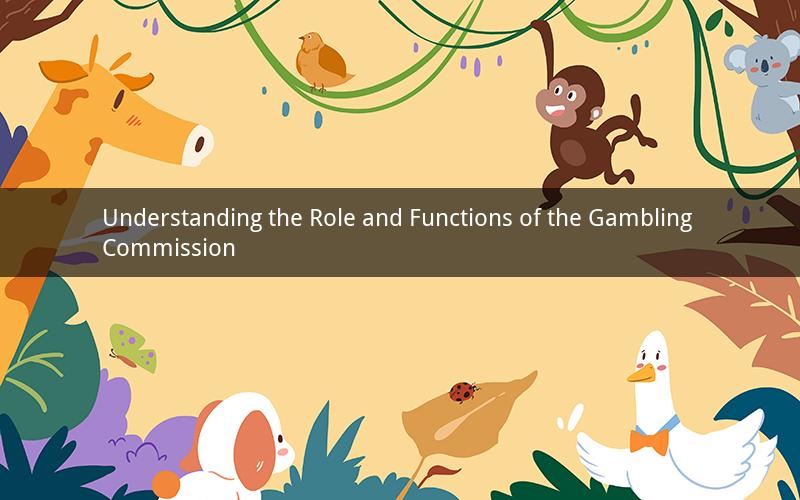
The Gambling Commission is a crucial regulatory body that oversees the gambling industry, ensuring fair play and consumer protection. This article delves into what the Gambling Commission is, its responsibilities, and its impact on the gambling sector.
What is the Gambling Commission?
The Gambling Commission is an independent, non-departmental public body responsible for regulating the gambling industry in Great Britain. Established in 2005, it replaced the Gaming Board for Great Britain, which was in existence since 1971. The Gambling Commission's primary objective is to ensure that gambling is fair and safe for all players.
Responsibilities of the Gambling Commission
1. Licensing and Regulation
One of the key responsibilities of the Gambling Commission is to license and regulate gambling operators in Great Britain. This includes casinos, betting shops, bingo halls, and online gambling sites. The Commission sets strict criteria for licensing, ensuring that operators meet the required standards of integrity, fairness, and customer protection.
2. Consumer Protection
The Gambling Commission is committed to protecting consumers from gambling-related harm. It achieves this by enforcing rules and regulations that prevent operators from engaging in misleading or deceptive practices. Additionally, the Commission provides guidance to operators on how to promote responsible gambling and support those who may be at risk of developing gambling-related issues.
3. Prevention of Illegal Gambling
The Gambling Commission plays a crucial role in preventing illegal gambling activities. It collaborates with law enforcement agencies to identify and shut down illegal gambling operations. By doing so, the Commission aims to protect consumers from unscrupulous operators and ensure a level playing field for legitimate businesses.
4. Research and Analysis
The Gambling Commission conducts research and analysis on various aspects of the gambling industry, including player demographics, problem gambling trends, and the impact of gambling on society. This information helps the Commission make informed decisions and develop policies that promote the well-being of consumers.
5. Compliance and Enforcement
The Gambling Commission monitors compliance with gambling laws and regulations, taking action against operators who fail to meet the required standards. This may include issuing fines, suspended licenses, or even revoking licenses in severe cases. By enforcing compliance, the Commission ensures that the gambling industry operates in a fair and transparent manner.
Impact of the Gambling Commission on the Gambling Sector
1. Enhanced Consumer Trust
The presence of the Gambling Commission has significantly enhanced consumer trust in the gambling industry. With strict regulations and licensing requirements, players can feel confident that they are engaging in fair and safe gambling activities.
2. Responsible Gambling Initiatives
The Gambling Commission has been instrumental in promoting responsible gambling initiatives. By enforcing rules and regulations, the Commission encourages operators to adopt responsible gambling practices, such as self-exclusion tools and deposit limits.
3. Safer Gambling Environment
The Gambling Commission's efforts in preventing illegal gambling and enforcing compliance have contributed to a safer gambling environment. By shutting down illegal operations and taking action against non-compliant operators, the Commission helps protect consumers from unscrupulous individuals.
4. Industry Growth
The Gambling Commission's regulatory framework has fostered the growth of the gambling industry. By creating a level playing field and ensuring fair competition, the Commission has allowed legitimate businesses to thrive while discouraging illegal operators.
5. Policy Development
The Gambling Commission's research and analysis contribute to the development of policies that promote the well-being of consumers. By understanding the gambling landscape, the Commission can make informed decisions and implement measures that address emerging challenges.
Frequently Asked Questions
1. Q: What is the Gambling Commission's main objective?
A: The main objective of the Gambling Commission is to ensure that gambling is fair and safe for all players.
2. Q: How does the Gambling Commission protect consumers?
A: The Gambling Commission protects consumers by licensing and regulating operators, enforcing rules and regulations, and promoting responsible gambling practices.
3. Q: Can the Gambling Commission revoke a gambling license?
A: Yes, the Gambling Commission can revoke a gambling license if an operator fails to meet the required standards or engages in illegal activities.
4. Q: How does the Gambling Commission prevent illegal gambling?
A: The Gambling Commission collaborates with law enforcement agencies to identify and shut down illegal gambling operations.
5. Q: What is the role of the Gambling Commission in research and analysis?
A: The Gambling Commission conducts research and analysis on various aspects of the gambling industry to inform policy development and promote consumer well-being.